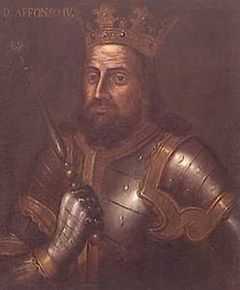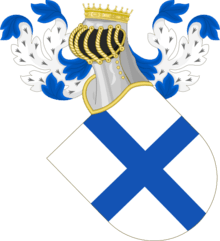Afonso IV of Portugal
| Afonso IV | |
|---|---|
 | |
| King of Portugal and the Algarve | |
| Reign | 7 January 1325 – 28 May 1357 |
| Predecessor | Denis |
| Successor | Peter I |
| Consort | Beatrice of Castile |
| Issue among others… |
Maria, Queen of Castile Peter I of Portugal Eleanor, Queen of Aragon |
| House | House of Burgundy |
| Father | Denis of Portugal |
| Mother | Elizabeth of Aragon |
| Born |
8 February 1291 Lisbon, Kingdom of Portugal |
| Died |
28 May 1357 Lisbon, Kingdom of Portugal |
| Burial | Lisbon Cathedral, Portugal |
| Religion | Roman Catholicism |
Afonso IV[1] (Portuguese pronunciation: [ɐˈfõsu]; 8 February 1291 – 28 May 1357), called the Brave (Portuguese: o Bravo), was King of Portugal and the Algarves from 1325 until his death. He was the only legitimate son of King Denis of Portugal by his wife Elizabeth of Aragon.
Early life
Afonso, born in Lisbon, was the rightful heir to the Portuguese throne. However, he was not Denis' favourite son; the old king preferred his illegitimate son, Afonso Sanches. The notorious rivalry between half brothers led to civil war several times. On 7 January 1325, Afonso's father died and he became king, whereupon he exiled his rival to Castile, and stripped him of all the lands and fiefdom given by their father. From Castile, Afonso Sanches, orchestrated a series of attempts to usurp the crown. After a few failed attempts at invasion, the brothers signed a peace treaty, arranged by Afonso's mother Queen Isabel Elizabeth.[2]
In 1309, Afonso IV married Infanta Beatrice of Castile, daughter of King Sancho IV of Castile by his wife María de Molina. The first-born of this union was Infanta Maria of Portugal.
King of Portugal and Algarve
In 1325 Alfonso XI of Castile entered a child-marriage with Costanza Manuel of Castile, the daughter of one of his regents. Two years later, he had the marriage annulled so he could marry Afonso's daughter, Maria of Portugal. Maria of Portugal became Queen of Castile in 1328 upon her marriage to Alfonso XI, who soon became involved publicly with a mistress.[2] Constance was imprisoned in a castle in Toro while her father, Juan Manuel, Prince of Villena, waged war against Alfonso XI until 1329. Eventually, the two reached a peaceful accord after mediation by Juan del Campo, Bishop of Oviedo; this secured Constance's release from prison.
The public humiliation of his daughter led Afonso IV marry his son and heir, Peter, to the no less aggrieved Castilian infanta, Costanza. Afonso IV also started a war against Castile.[2] Peace arrived four years later, through the intervention of Infanta Maria herself. A year after the peace treaty was signed in Seville, Portuguese troops played an important role in defeating the Moors at the Battle of Río Salado in October 1340.
Later life

Political intrigue marked the last part of Afonso IV's reign, although Castille was torn by civil war after Alfonso XI died. Henry of Trastámara challenged the new King Pedro of Castile, who sent many Castilian nobles into exile in Portugal. Afonso's heir, Pedro fell in love with his new wife's lady-in-waiting, Inês de Castro. Inês was the daughter of an important noble family from Galicia, with links (albeit illegitimate) to both the royal houses of Castile and Portugal. Her brothers were aligned with the Trastamara faction, and became favorites of crown prince Pedro, much to the dismay of others at the Portuguese court, who considered them Castilian upstarts. When Constance of Peñafiel died weeks after giving birth to their third child, Pedro began living openly with Inês, recognized all her children as his and refused the idea of marrying anyone other than Inês herself. His father refused to go to war again against Castile, hoped his heir's infatuation would end, and tried to arrange another dynastic marriage for Pedro.
The situation became worse as the years passed and the aging Afonso lost control over his court. His grandson and Pedro's only legitimate son, future king Fernando of Portugal, was a sickly child, while Inês' illegitimate children thrived. Worried about his legitimate grandson's life, and the growing power of Castile within Portugal's borders, Afonso ordered Inês de Castro first imprisoned in his mother's old convent in Coimbra, and then murdered in 1355. He expected his son to give in and marry a princess, but the heir became enraged upon learning of his lover's decapitation in front of their young child. Pedro put himself at the head of an army and devastated the country between the Douro and the Minho rivers before he was reconciled to his father in early 1357. Afonso died almost immediately after, in Lisbon in May.
Afonso IV's nickname the Brave alludes to his martial exploits. However, his most important contributions were the relative peace of his long reign and the importance he gave to the Portuguese Navy. Afonso IV granted public funding to raise a proper commercial fleet and ordered the first maritime explorations. The conflict with Pedro, and eventually the explorations they began, became the foundation of the Portuguese national epic, Os Lusíadas by Luís de Camões. The dramatic situation between father and son and Inês, became plots in more than twenty operas, as well as "Nise lastimosa" and "Nise laureada" (1577) by Jerónimo Bermúdez, 'Reinar despues de morir' by Luís Vélez de Guevara, "Inez de Castro" by Mary Russell Mitford, and La Reine morte (The Dead Queen) by Henry de Montherlant.[3]
Ancestry
| Ancestors of Afonso IV of Portugal | ||||||||||||||||||||||||||||||||||||||||||||||||||||||||||||||||||||||||||||||||||||||||||||||||||||||||||||||||||||||||||||||||||||||||||||||||||||||||||||||||||||||||||||||||||||||||||||||||||||||||||||||||||||||||||||||||||||||||||||||||||||||||||||||||||||||||||||||||||||||||||||||||||||||||||||||||||||||||||||||||||||||||||||||||||||||||||||||||||||||||||||||||||||||||||||||||||||||||||||||||||||||||||||||||||||||||||||||||||||||||||||||||||||||||||||||||||||||||||||||||||||||||||||||||||||||||||||||||||
|---|---|---|---|---|---|---|---|---|---|---|---|---|---|---|---|---|---|---|---|---|---|---|---|---|---|---|---|---|---|---|---|---|---|---|---|---|---|---|---|---|---|---|---|---|---|---|---|---|---|---|---|---|---|---|---|---|---|---|---|---|---|---|---|---|---|---|---|---|---|---|---|---|---|---|---|---|---|---|---|---|---|---|---|---|---|---|---|---|---|---|---|---|---|---|---|---|---|---|---|---|---|---|---|---|---|---|---|---|---|---|---|---|---|---|---|---|---|---|---|---|---|---|---|---|---|---|---|---|---|---|---|---|---|---|---|---|---|---|---|---|---|---|---|---|---|---|---|---|---|---|---|---|---|---|---|---|---|---|---|---|---|---|---|---|---|---|---|---|---|---|---|---|---|---|---|---|---|---|---|---|---|---|---|---|---|---|---|---|---|---|---|---|---|---|---|---|---|---|---|---|---|---|---|---|---|---|---|---|---|---|---|---|---|---|---|---|---|---|---|---|---|---|---|---|---|---|---|---|---|---|---|---|---|---|---|---|---|---|---|---|---|---|---|---|---|---|---|---|---|---|---|---|---|---|---|---|---|---|---|---|---|---|---|---|---|---|---|---|---|---|---|---|---|---|---|---|---|---|---|---|---|---|---|---|---|---|---|---|---|---|---|---|---|---|---|---|---|---|---|---|---|---|---|---|---|---|---|---|---|---|---|---|---|---|---|---|---|---|---|---|---|---|---|---|---|---|---|---|---|---|---|---|---|---|---|---|---|---|---|---|---|---|---|---|---|---|---|---|---|---|---|---|---|---|---|---|---|---|---|---|---|---|---|---|---|---|---|---|---|---|---|---|---|---|---|---|---|---|---|---|---|---|---|---|---|---|---|---|---|---|---|---|---|---|---|---|---|---|---|---|---|---|---|---|---|---|---|---|---|---|---|---|---|---|---|---|---|---|---|---|---|---|---|---|---|---|---|---|---|---|---|---|---|---|---|---|---|---|---|---|---|---|---|---|---|---|---|---|---|---|---|---|---|---|---|---|---|---|---|---|---|---|---|---|---|---|---|---|---|---|---|---|---|---|---|---|---|---|---|---|---|---|---|---|---|---|---|---|---|---|---|---|---|---|---|---|---|---|---|---|---|---|---|---|---|---|---|---|---|---|---|---|---|---|
| ||||||||||||||||||||||||||||||||||||||||||||||||||||||||||||||||||||||||||||||||||||||||||||||||||||||||||||||||||||||||||||||||||||||||||||||||||||||||||||||||||||||||||||||||||||||||||||||||||||||||||||||||||||||||||||||||||||||||||||||||||||||||||||||||||||||||||||||||||||||||||||||||||||||||||||||||||||||||||||||||||||||||||||||||||||||||||||||||||||||||||||||||||||||||||||||||||||||||||||||||||||||||||||||||||||||||||||||||||||||||||||||||||||||||||||||||||||||||||||||||||||||||||||||||||||||||||||||||||
Marriage and descendants
Afonso married Beatrice of Castile (1293–1359) in 1309, daughter of Sancho IV of Castile, and María de Molina and had four sons and three daughters.
| Name | Birth | Death | Notes |
|---|---|---|---|
| By Beatrice of Castile (1293–1359; married in 1309) | |||
| Infanta Maria | 1313 | 1357 | Queen of Castile by marriage to Alfonso XI of Castile. |
| Infante Afonso | 1315 | 1315 | |
| Infante Dinis (Denis) | 1317 | 1318 | |
| Infante Pedro | 8 April 1320 | 18 January 1367 | Succeeded him as Peter I, 8th King of Portugal. |
| Infanta Isabel | 21 December 1324 | 11 July 1326 | |
| Infante João (John) | 23 September 1326 | 21 June 1327 | |
| Infanta Leonor (Eleanor) | 1328 | 1348 | Queen of Aragon by marriage to Peter IV of Aragon. |
| Illegitimate offspring | |||
| Maria Afonso | 1316 | 1384 | Natural daughter. |
Notes
- ↑ English: Alphonzo or Alphonse, or Affonso (Archaic Portuguese), Alfonso or Alphonso (Portuguese-Galician) or Alphonsus (Latin).
- ↑ 2.0 2.1 2.2 Spain and Portugal, Graeme Mercer Adam ed., J. D. Morris, 1906
- ↑ IMDB datasheet
External links
-
 This article incorporates text from a publication now in the public domain: Chisholm, Hugh, ed. (1911). "Alphonso". Encyclopædia Britannica (11th ed.). Cambridge University Press.
This article incorporates text from a publication now in the public domain: Chisholm, Hugh, ed. (1911). "Alphonso". Encyclopædia Britannica (11th ed.). Cambridge University Press.
|
| Afonso IV of Portugal Born: 8 February 1291 Died: 28 May 1357 Capetian dynasty | ||
| Regnal titles | ||
|---|---|---|
| Preceded by Denis |
King of Portugal and the Algarve 1325–1357 |
Succeeded by Peter I |
| ||||||||||||||||||||||||
| ||||||||||||||||||||||||||||||||||||||||||||||||||||||||||||||||||||||||||||||||||||||||||||||||||||||||||
| |||||||||||||||||||||||||||||||||||||||||||||||||||||||||||||||||||||||||||||||||||||||||||||||||||||||||||||||||||||||||||||||||||||||||||||||||||||||||||||||||||||||||||||||||||||||||||||||||||||||||||||
.svg.png)
